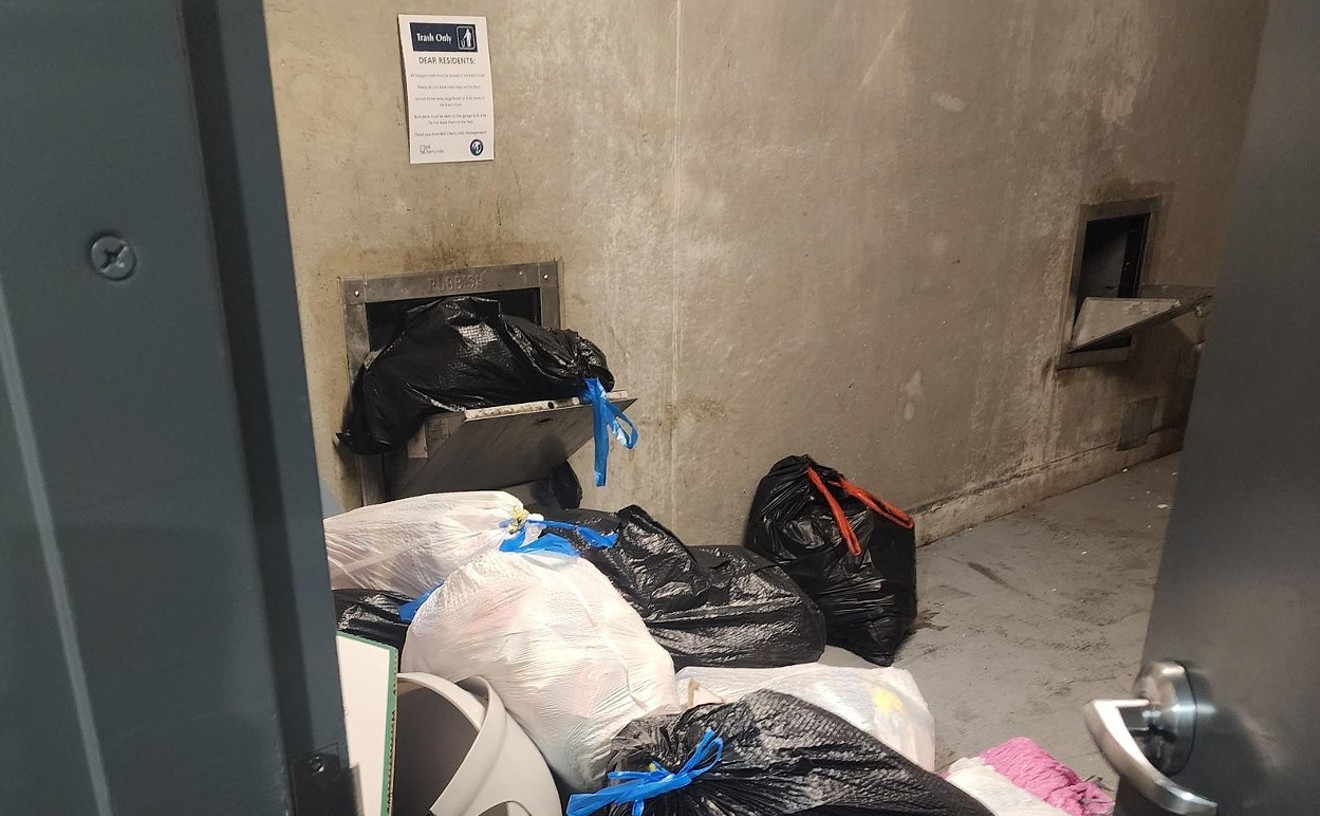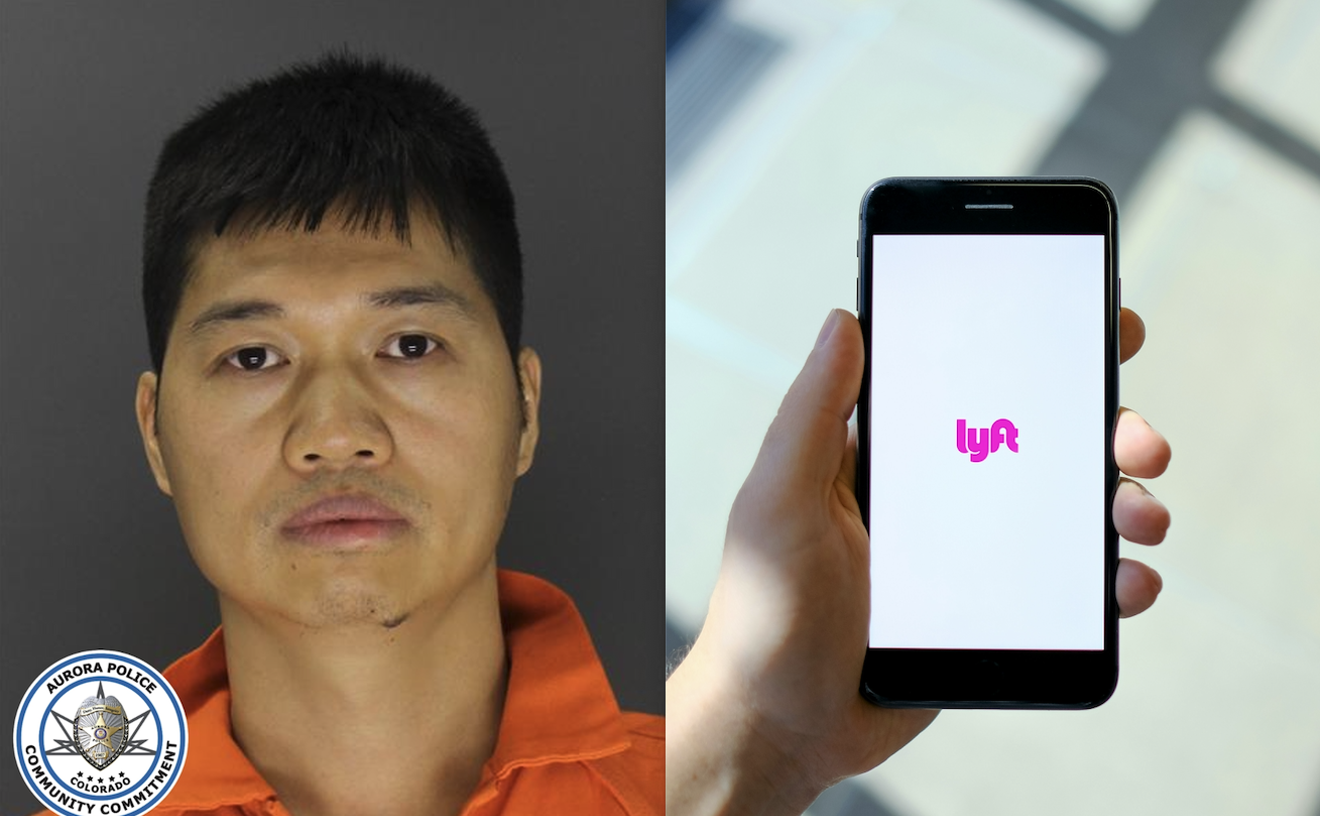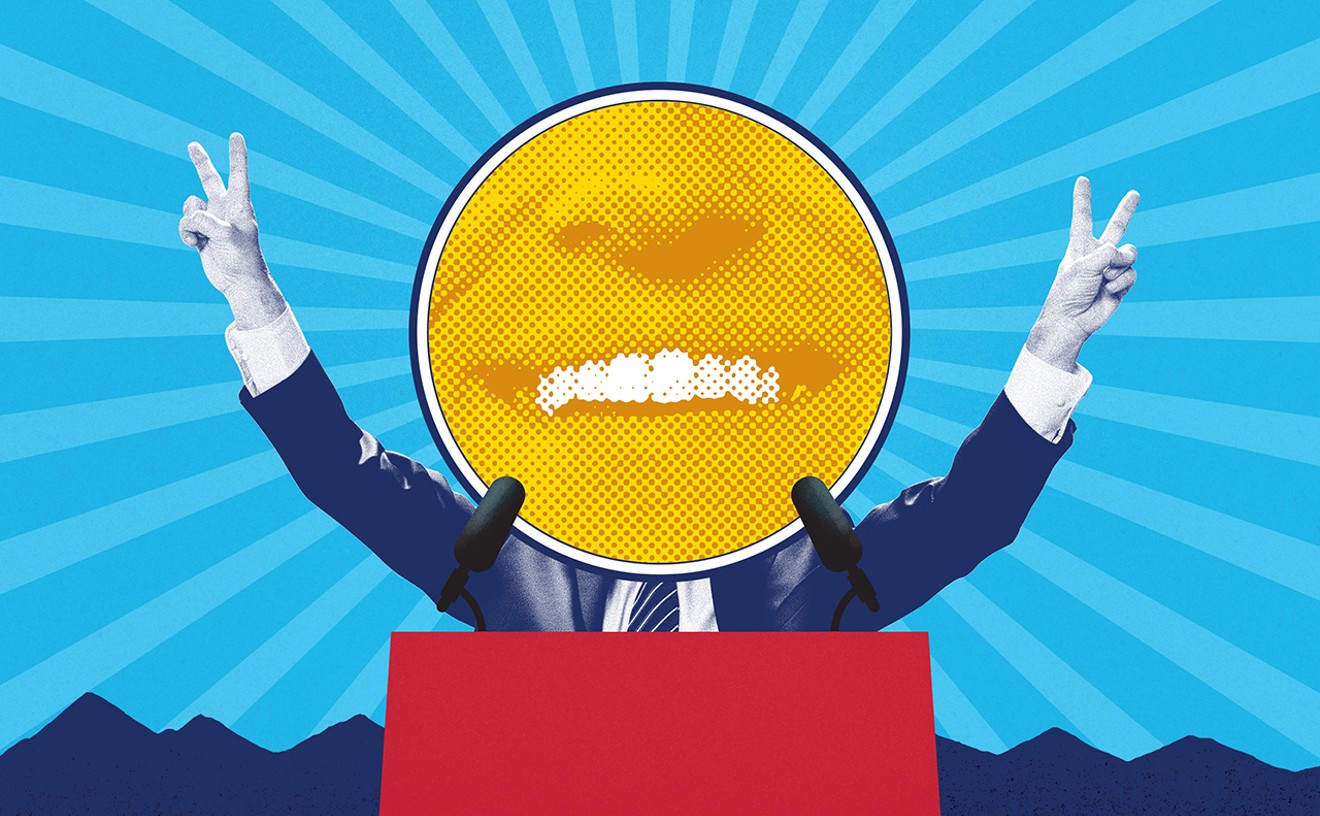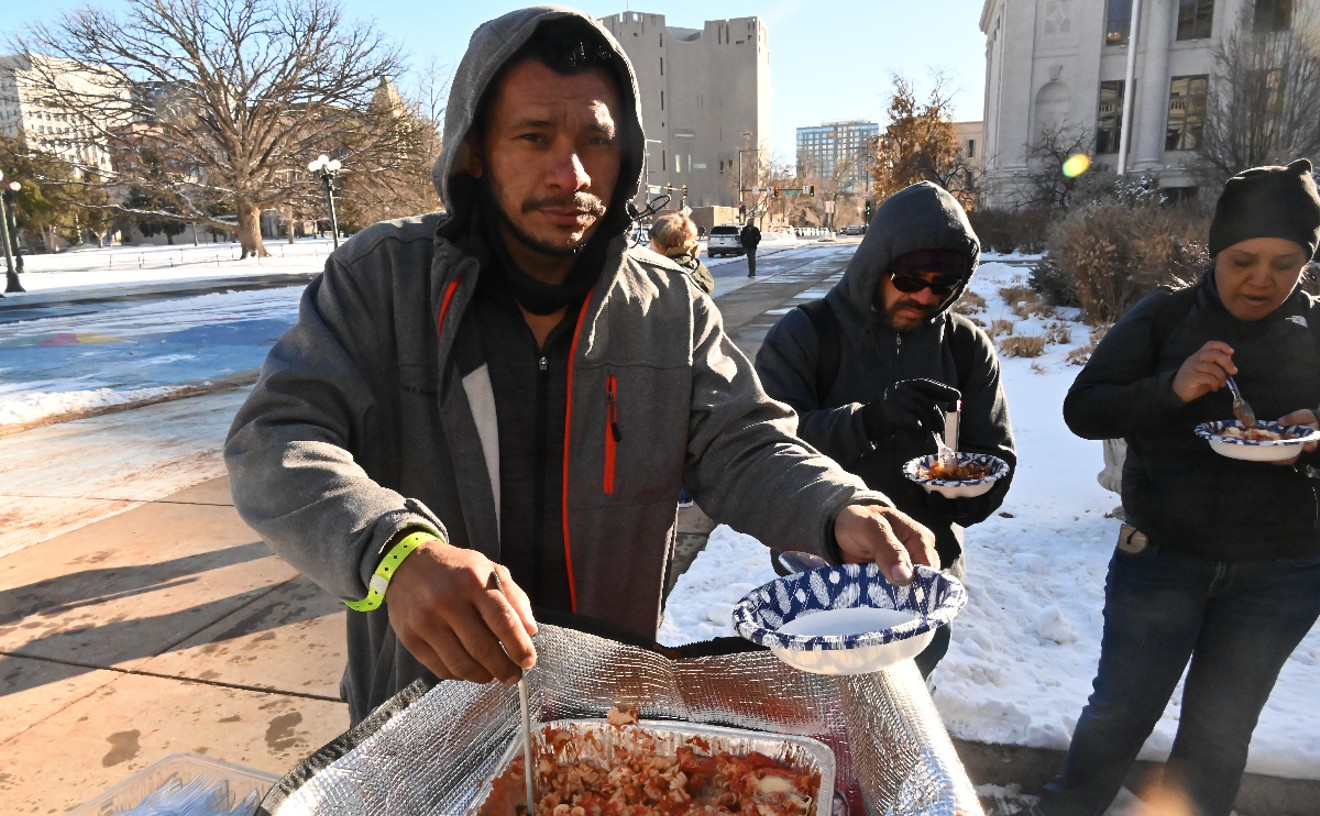Those who followed last month's trial of the man who murdered eighteen-year-old Angie Zapata know a lot about what her life was like on July 14, 15 and 16 of last year.
They know how two of her sisters found her on July 17, lying on the carpeted living-room floor of her one-bedroom apartment in Greeley, her stiff body covered with a bloodstained blanket. How three days earlier, she'd borrowed her mother's car to pick up a guy in Thornton. How she hadn't told friends or family who he was.
That guy was Allen Andrade, an unemployed 31-year-old whom Angie had met on the social networking website MocoSpace. Andrade spent three days with Angie, and on the third day, Angie went to babysit her sister Monica's three kids. After that, according to court testimony, Angie stopped by a friend's apartment in Greeley. She told her friend there was an older guy staying with her and that she was going to get him to help her pay one of her bills. Then, she said, she was going to kick him out.
Andrade had spent the day alone in Angie's apartment and later told police that he'd begun to grow suspicious of Angie's gender after looking at the photographs that decorated her neat living room. That night, he said, he confronted her about it.
"I am all woman," Angie told him.
Andrade asked Angie to prove it. She refused. So he did it himself, grabbing her crotch. He felt a penis, he later told the police, and reacted by beating her with his fists until she fell down. Then he grabbed a fire extinguisher from the kitchen wall and hit her twice in the head. After that, he covered her with a blanket and began cleaning up.
But Angie wasn't dead. Andrade told the police he heard gurgling sounds coming from underneath the blanket and saw her struggling to sit up. So he hit her in the head with the fire extinguisher once more. Then he grabbed his stuff and fled.
Those are the grisly details of Angie's murder, the ones that made her family sob in the courtroom, that prosecutors diagrammed, that defense attorneys tried to rebut — that a jury used to convict Andrade of murder. But these details only describe the end of Angie's life. They don't reveal what she meant to friends and family or answer questions about who Angie was before she met Andrade and how she found herself with him.
What follows are vignettes from five people who knew her, from the time she was a little boy named Justin to the evolution that turned her into a confident, sassy and fun young woman named Angie — a brave young woman who was looking for love.
Rochelle Camacho, childhood friend
In first grade, he was "Jus." Justin David Zapata was Rochelle Camacho's funny, energetic friend, the one who got her a Barbie doll for her birthday and climbed trees with her in her back yard. The one who had a crush on the same boy that she did.
"We had two friendship rings, and I was like, 'Let's drop our rings in front of him and whomever's he picks up first, that's who he likes,'" recalls Camacho, now twenty. She remembers Justin as feminine, but in elementary school, that didn't really matter.
It became a problem at Fort Lupton Middle School. By that time, Justin had told his friends that he liked boys. "We started laughing, because we were like, 'Girl, you didn't even need to tell us that,'" Camacho says.
Other kids weren't so understanding, and they whispered behind his back, especially after he started growing out his thick, black hair. Camacho remembers one time when they were at TJ's, the local convenience store in tiny Fort Lupton, where they'd walk to buy chili-and-cheese nachos. They ran into a group of girls from school, and Justin told her they didn't like him because he liked boys. "I got so mad, because she told me that they had said something to her or given looks to her," Camacho says. "I threw my makeup at them."
It wasn't long after that that Justin made another confession. One day he came over to her house with girl's clothing and a tube of mascara. He changed out of his sweatpants and T-shirt and transformed into Angie. "I loved her so much, I didn't care," Camacho says. "I was like, 'Hell, yeah. If that's what you want to wear, let's wear it.'"
At first, Justin kept Angie under wraps. At school, he was Justin. But after school, for a few precious hours in the safety of friends' homes, he was Angie, a name he picked simply because he liked it, because he thought it sounded sexy to say "Angelica" in Spanish. People in Fort Lupton talked. But, Camacho says, it came to matter less and less.
At around age sixteen, Angie began being Angie all of the time. "Her makeup was the shit," Camacho says. "It's like, 'You're a boy, I'm a girl, and you do your makeup better than my ass....' And her hair — oh my God, I hated her freaking hair."
It took Angie two and a half hours to do her hair, to first blow-dry her long locks, then straighten them, then curl the ends. She was equally meticulous about her clothes — which Camacho described as "cute and tight and a little hoochie" — though she wasn't picky about brand names: "If it wasn't good, she'd make it look good."
And Angie always had to look good when she went out, whether it was to cruise up and down Federal Boulevard in Denver, listening to music and smoking cigarettes, or to dance at Tracks, a gay nightclub on Walnut Street. Angie and her friends went there most Thursdays and danced until their legs burned, Camacho says.
It's the one-on-one time that Camacho misses most. Like the time she and Angie gave each other tattoos with India ink, or the time they tried to wax each other's legs. "Oh, my God, do not give us bleach," Camacho says. "We'd go to the store and get some dye, and literally, it was bad. She tried to give me streaks. Oh, no. I looked like a freaking cheetah. I had spots all over my head."
Angie was silly, Camacho says, always telling jokes and "talking crap." "I'd say, 'At least I have boobs and I don't need socks,'" Camacho says. "And she'd say, 'At least my boobs are perfect with these socks.'" Angie would sing along to Celine Dion to make her friends laugh, and she'd make up raps. She was constantly being funny.
But she was also strong, toughened from years of teasing. When she got hurt, she didn't really show it. Camacho remembers that when they went together to enroll at Artistic Beauty College in Thornton to become cosmetologists, the instructors told Angie that at school, she'd have to eschew her makeup, pull her hair back and go by "Justin."
"When they said she couldn't wear makeup, I was like, 'Fuck that! Hell, no!" Camacho says. "But she was like, 'It's okay. I still want to go school.'" But Camacho could tell Angie was hurt. They never spoke about it again, and they never went back.
Instead, Angie continued babysitting her sister's three kids. She told friends that when the youngest, three-year-old Diego, was old enough to go to school, she'd try again. She never got the chance. "Every time I close my eyes, I can picture her looking at me," Camacho says. "Sometimes I try not to think about her. She's not ever going to come back."
Stephanie Villalobos, sister
Stephanie Villalobos's little brother never wanted to play with trucks. He wasn't interested in pretend races, and he never even opened the Hot Wheels cars he got as presents.
Instead, he liked to watch his older sisters apply their makeup. He liked to braid the rat-tail he wore at the nape of his neck. And when the grownups cut it off, he wrapped a blue baby blanket around his head, gathered the excess into a ponytail and swung it around. "When she was seven or eight, she already knew how to walk in heels," Stephanie, 23, says of her sister Angie, the woman her brother Justin would become. "She knew what makeup was called and what went where."
Stephanie remembers when Justin told the family he was transgender. She, Justin, their sister Ashley and their mother were sitting around, gossiping and telling secrets about themselves. Ashley admitted that she wasn't a virgin anymore, and Stephanie confessed that she was gay. Justin said he "liked guys but wasn't gay" and that he felt he was a woman.
But things were hard at school. Angie often came home crying, upset because kids were picking on her. Stephanie, who was four years Angie's senior, felt she had to defend her little sister. "They'd be like, 'Your brother is gay,'" Stephanie says of the bullies. "I'd be like, 'So what if he's gay? How are you going to stop it?'"
The family encouraged Angie to fight back. One time, two guys were harassing her at a gas station. She came home and told Stephanie, and they went looking for them. When they found them, Angie asked if they wanted to fight. "They started swinging at each other," Stephanie recalls. "She was beating them up so bad, making them bleed."
Afterward, she told the guys to tell their friends they'd been beaten up by a joto, Spanish slang for a homosexual. She was five-foot-ten — six feet with heels on — and she didn't take crap.
But even though she could be tough, Angie was tender with her family. She'd listen to Stephanie talk about problems with her girlfriend and try to mediate fights between her sisters. "I think everybody, their number-one person to go to was Angie when they had a problem," Stephanie says. "Now that she's not around, we go to each other."
Gonzalo Zapata, brother
About three years ago, Gonzalo Zapata and his five siblings — Monica, Stephanie, Ashley, Angie and Nicole — decided to take a portrait for their mother for Christmas. They told Angie she had to dress as a boy. They wanted their mother to be happy; at the time, he says she was struggling to accept that her son Justin was really a girl who wanted to be called Angie. She was scared for what a transgender life might mean.
In that photo, it's clear that Angie is unhappy, Gonzalo says. Dressed in one of Gonzalo's sweaters, her long hair curled at the ends, she looks uncomfortable. Her smile looks fake. "We apologized later on," says Gonzalo, 25. "At the time, he understood it."
Gonzalo also initially had a hard time accepting that his brother was born in the wrong body. "It took me a while to accept that she wanted to dress as a girl because she and I were the only boys, and I wanted to have someone to talk to," he says. But eventually, Angie's bravery encouraged him to be honest about himself: Gonzalo, like Stephanie before him, told his mother that he was gay.
Living under the same roof in Fort Lupton, Gonzalo and Angie had a good brother-sister relationship. He ribbed her about spending too much time in the bathroom. "I'd be like, 'You can't perfect something that's not there,'" he says. "And she'd be like, 'Don't hate me because I'm beautiful.'" She'd threaten to tell on Gonzalo when he brought friends home. But as the oldest boy in a single-parent household, Gonzalo also assumed a father-figure role, keeping a watchful eye on his little sister's wardrobe: "I'd tell her, 'That's a little too short for you to wear. That's too hoochie for you to wear. Take it off.'"
When Angie turned eighteen, she started going to Tracks, a nightclub that Gonzalo also frequented while he was a college student in Denver. He remembers the first time he saw her there. At first, he didn't recognize her. Standing by the bar, he told his friends he thought he knew her from somewhere and walked over to get a closer look. That's when he realized it was his sister. He was floored by the way she danced. "She'd dance like she was a professional choreographer. She had her own signature moves," he says. "To be honest with you, she just wanted the attention. She got it."
When Angie moved to Greeley last March, Gonzalo saw less and less of her. The last time he saw her was at Denver PrideFest in late June. But he talked to her a few days before her murder, when she called to ask for gas money. "I said no. 'The word of the day is job. J-O-B. Get one,'" Gonzalo told her. "I'm the type of brother who'd talk smack and then I'd give in. I tried to call her back, but she was mad and didn't pick up."
Gonzalo says he wishes there was something he could have done to prevent what happened next. He feels like he should have been able to protect his little sister.
"She was a very beautiful girl," Gonzalo says. "She wanted to be happy and to have people live the way they wanted to live. Her thing was, if I'm not going to mess with you, don't mess with me. She'd say, 'I'm not here to judge you. Don't judge me.'"
Kitty DeLeon, mentor
Kitty DeLeon wanted Angie to have everything she didn't. "When I was growing up, it was difficult," DeLeon, who is in her thirties, says of her childhood in Fort Lupton. "I wasn't like Angie. Angie fought, and I was not a fighter."
DeLeon met Angie about four years ago. It was Christmastime, and their nieces were in the same school play. DeLeon had grown up with Angie's oldest sister, Monica, and when their mother saw DeLeon at the play, she waved her over and invited her to sit with them.
"I remember sitting there watching the play, and I looked over, and Angie was like this," she says, turning her head to the side, her eyes wide. "At first, I was like, 'Whoa, what is she staring at me for?' And then I realized she was like me, but a fifteen-year-old version. The first thing I did was, I told Monica, 'Your sister is very beautiful.'"
The next day, DeLeon, who is also transgender, says she called Angie's mother and offered to give her daughter advice. Over the next few years, Angie and DeLeon talked about once a month. "I told her, 'Angie, there's always going to be people who are very intimidated. You need to not listen to them. Because you and I both know it's not our fault.' I told her, 'You be proud of who you are.'"
DeLeon says she talked to Angie about what it's like to take female hormones and showed her exercises to increase her bust. She warned her against rushing to have sexual-reassignment surgery — "I told Angie, 'You should wait. You should wait. Don't do it right away, because you might regret it.... There's guys that like women like that." She encouraged her to compete in drag beauty pageants, like she did.
"She always did her makeup very beautiful, her hair very beautiful. And she'd always yell at her sisters when they wouldn't do it. She'd go, 'Ugh! Comb your hair!'"
DeLeon also told Angie to be careful with men. "I told her, 'Angie, not all men are going to be accepting to you, so it's very important that you don't lie to nobody. Nobody. Because you can set yourself up in a situation and...'"
DeLeon knows Angie listened. One time, DeLeon called the transgender section of Livelinks, a singles chat line, to leave a prank message for a friend — and heard a recording of Angie. "She used her own name — Angie — she said she was from Greeley, she said she was transgender and she described herself," DeLeon says. "I recognized her voice. And I was like, oh look, it's Angie. And she's following my advice."
Still, when DeLeon heard that Angie had been murdered, her first thought was that she'd died at the hands of some man. "When I got there and they told me everything, I was like, oh, he definitely did it. He definitely did," DeLeon says. "I think that what it was is that he was just getting uncomfortable with the whole thing. But he could have just left. He didn't have to go to the extent of killing her."
Maria Zapata, mother
It was the stares that got to Maria Zapata. One day, when she and Angie were at the checkout stand at the Greeley Wal-Mart, she sensed that someone was staring at them and turned around. "I looked and I told my Angie, I said, 'Who in the hell are they looking at?'" recalls Maria, who is 54. "She said, 'Mom, they're just staring at me.' I turned around and I said, 'Don't you have anything else to stare at?'
"I hated for people to be looking at her, looking her up and down like [she was] trashy."
Even though Angie was the fifth of six children, she was always Maria's baby. When she talks about her, she calls her "my Angie." "There was just something about Angie," Maria says. "There was a sense from the beginning that I needed to protect her more than the rest."
Angie was born in Brighton on August 5, 1989, as Justin David Zapata. Justin was Maria's second son. By the time he was born, she'd been married and divorced once and had four children from three different relationships. Justin was a skinny kid with eyelashes so dark it looked like he was wearing mascara, she says. He was never interested in dump trucks or baseball bats, but he loved to play outside. The second he finished a meal, he'd run out the door to ride his bike.
But Justin's life was hard. Kids at school teased him for being effeminate and called him "faggot." Teachers weren't much better. "I remember her second-grade teacher said she went to the bathroom in the girls' bathroom (as Justin), that's disgusting," Maria says. "A lot of people didn't know, but they were ready to judge."
It got worse as Justin got older. "She wanted to get involved with sports, she wanted to get involved with school, but it always came out that the kids were so rude," Maria says. Justin tried to join the soccer team, the track team, the band. But the same thing always happened. "Kids said, 'There goes that weird guy. There goes that gay guy.'"
Maria knew her youngest son was different, and she was scared. "It's not that I didn't accept it," Maria says. "I was afraid for her because I knew how people are." She insisted that Justin wear boys' clothes and cut his hair short. But he was miserable.
"Finally, I just gave up," she says. "I thought, why am I putting my baby through misery? She's miserable enough as it is. I told her, 'Please just be careful. Be careful, because there are going to be people who won't accept it, and you're going to get hurt, baby.'"
Maria's own family — her mother was from Mexico, her father from Texas — had a hard time accepting Angie. "Growing up in the Mexican culture, woman is woman and man is man," Maria says. Maria's aunts and uncles "weren't rude to her, but the staring, the talking behind her back, that hurt my baby a lot. And that hurt me."
When Angie was in high school, she transferred from Fort Lupton High School to Brighton Collegiate High School, a charter school, in an attempt to escape the teasing. But it wasn't any better in Brighton, Maria says. Angie still got harassed, still got into fights, still had to defend herself. At sixteen, she decided to drop out.
"She wanted to do so much with her life, but because...people would not accept her and people were rude to her, she just didn't want to do it anymore," Maria says.
Instead, she went to work, first at Good Times and then as a babysitter for her sister Monica's kids. She wanted to save money to have a sex change, her mother says. Angie even saw a doctor in Denver, who explained to her about the counseling involved and what it's like to do hormone therapy. "But everything cost so much," Maria says. "If we would have been able to afford it, Angie would have been able to have that."
Early last year, Angie moved to Greeley, where Maria lives. She got a one-bedroom apartment two and a half blocks away. She wanted to try living on her own. Mother and daughter were close, but Angie didn't tell Maria everything. Maria knew Angie had tons of friends and dated occasionally. She knew she wanted a companion.
That's what Maria thinks led Angie to Allen Andrade.
"She wanted to be loved so much she was willing to trust people that she thought were trustworthy," Maria says. "That was a hard lesson. Somebody like that, she probably thought that he was honest and he wanted a relationship."
Maria blames herself for Angie's death. She goes over and over it in her head: If only she hadn't lent Angie the car. If only she had looked out the window to see who was with Angie when she returned. If only Angie had been living with her, and not in her own apartment. Maria's other children tell her to stop, to leave Greeley and be closer to them in Fort Lupton. But Maria can't leave. She can't leave Angie. "There's times I would feel her presence here," she says. "I can even smell her. That's how much I miss her.
"When I go to work, I have to come back home, rush back home to be with her," she adds. "I don't want to leave her alone. I say, 'I'm here, baby, I'm here. I'm home.'"











